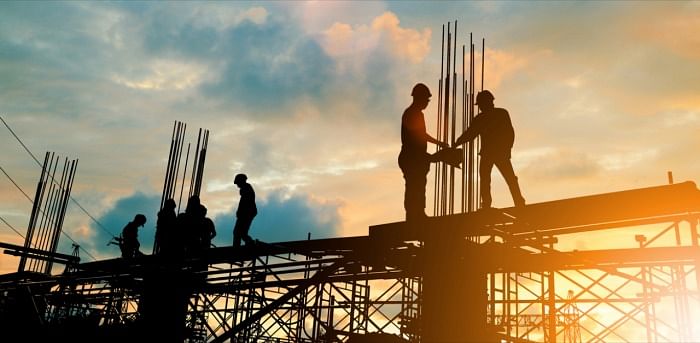
In order to achieve $5 trillion GDP by FY'25, India needs to spend about $1.4 trillion over this period on infrastructure, according to the Economic Survey.
During financial years 2008-17, India pumped in about $1.1 trillion on infrastructure. However, the challenge is to step up infrastructure investment substantially, the Economic Survey 2021-22 said.
"Keeping this objective in view, National Infrastructure Pipeline (NIP) was launched with projected infrastructure investment of around Rs 111 lakh crore ($1.5 trillions) during FY2020-2025 to provide world-class infrastructure across the country, and improve the quality of life for all citizens," it said.
It also envisages to improve project preparation and attract investment, both domestic and foreign in infrastructure.
NIP was launched with 6,835 projects, which has expanded to over 9,000 projects covering 34 infrastructure sub-sectors. During the fiscals 2020-2025, sectors such as energy (24 per cent), roads (19 per cent), urban (16 per cent), and railways (13 per cent) amount to around 70 per cent of the projected capital expenditure in infrastructure in India.
NIP has involved all the stakeholders for a coordinated approach to infrastructure creation in India to boost short-term as well as the potential GDP growth.
"Infrastructure is the backbone for any economy. The extent and quality of infrastructure determines the ability of the country to utilise its comparative advantage and enables cost competitiveness. Given the strong backward and forward linkages and the positive externalities that infrastructure generates, it can be a vehicle for social and economic transformation," it added.
Public private partnership in infrastructure has been an important source of investment in the sector. As per the database of the World Bank on private participation in infrastructure, India is ranked second among developing countries both by the number of PPP Projects as well as the associated investments.
Much of the Indian success in PPPs is attributed to development of robust institutional structure, financial support, and use of standardised documents, both process documents like model request for qualification and model request for proposal as well as substantive documents like the model concession agreements across infrastructure sectors.
The Public Private Partnership Appraisal Committee (PPPAC) which is responsible for the appraisal of PPP projects has cleared 66 projects with a total project cost of Rs 1,37,218 crore from 2014-15 to 2020-21.
The government launched the Viability Gap Funding (VGF) scheme for providing financial assistance to financially unviable but socially/ economically desirable PPP projects. Up to 20 per cent of the project cost is funded under this scheme as a grant.
"...the total VGF amount disbursed between 2014-15 to 2020-21 by DEA is Rs 2,943 crore. Further, the government in November 2020 approved continuation of and revamping of the Scheme for Financial Support to Public Private Partnerships (PPPs) in Infrastructure Viability Gap Funding (VGF) Scheme till 2024-25," the survey said.
The revamped VGF scheme is expected to attract more PPP projects and facilitate private investment in social sectors such as health, education, waste water, solid waste management and water supply, among others, it added.
Check out the latest DH videos here: